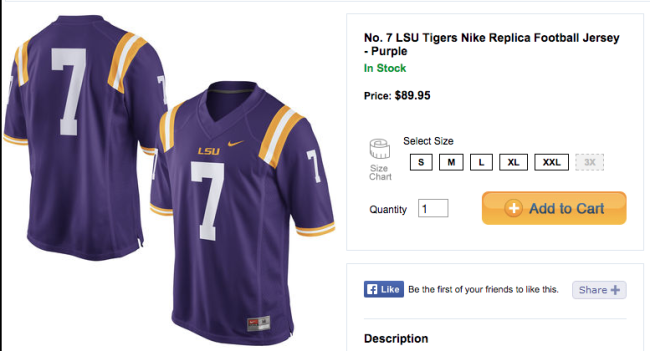You have /5 articles left.
Sign up for a free account or log in.

A replica of Leonard Fournette's jersey for sale on LSU's website
Louisiana State University
The heavy flooding that devastated parts of South Carolina this month cast a shadow over Saturday’s football game between Louisiana State University and the University of South Carolina. The game was moved to LSU because of the flooding, and out of respect for the state and the university, LSU’s marching band played South Carolina’s fight song.
But it was a different gesture that dominated postgame headlines: LSU running back Leonard Fournette told reporters that he would auction off his jersey and give the proceeds to flood relief efforts in South Carolina. Moments later, however, Fournette said he would be unable to do so, as such an auction is a violation of National Collegiate Athletic Association rules. Then, an hour later, came another reversal.
“Leonard Fournette can auction his jersey for SC flood victims,” the NCAA tweeted.
NCAA rules about athletes earning money from their own names and likenesses are famously rigid, even in cases of charity, and the rules have prevented such efforts in the past. That the NCAA will allow Fournette’s auction means that college officials have either long interpreted those rules incorrectly, that the NCAA is making an exception for the running back or that the association is beginning to soften its rules.
The NCAA declined to clarify its decision this week, saying that it had “nothing additional to share.”
The association’s longstanding stance on issues pertaining to players’ names and likeness has been under attack in recent years. In 2013, the NCAA admitted that the association's practice of selling player jerseys on its website was a “mistake,” after an ESPN analyst criticized the practice. While athletes were unable to sell their own autographs or jerseys under NCAA rules, the website’s search function allowed fans to type in a player’s name to find and purchase the corresponding jersey. Colleges still sell individual jerseys, but with only the players' numbers printed on the shirts, even if sports fans know exactly which stars wear which numbers.
Last year, the NCAA lost a lawsuit brought by former college basketball player Ed O’Bannon over the NCAA’s use of his and other players’ likenesses in a series of video games. The judge ruled -- in a decision that was later upheld in appellate court -- that the NCAA’s rules violated antitrust law, though the association was not required to change them.
In September, the Pacific 12 Conference introduced a proposal that would allow athletes to use their "names, images and likenesses to promote their own nonathletic business ventures." The measure will be voted on at the NCAA’s annual meeting in January.
During a panel discussion organized by the Big 12 Conference earlier this year, several athletes said that the NCAA’s rules regarding name and likeness have stymied efforts to use their athletic identities to help people in need. Sune Agbuke, a women’s basketball player at Baylor University, said she and her teammates were unable to organize a team trip to visit those in West, Texas, who were affected by the massive fertilizer factory explosion there in 2013. Ty Darlington, a football player at the University of Oklahoma, said the rules have prevented him from using his status as an athlete to raise funds for a charity trip to Haiti.
Unlike Darlington and Agbuke, who discussed their frustrations years later in a panel discussion, Fournette announced his idea on camera in a postgame interview. Fournette is a beloved college athlete, and his comments coincided with his appearance this week on the cover of Sports Illustrated, which also lists him as the most likely football player to win the Heisman Trophy this season. He lost his home during Hurricane Katrina when he was 10, and for a week lived underneath a New Orleans overpass.
“I want to send my prayers, condolences and empathy to the people of South Carolina,” he said Saturday. “What they are going through reminds me of what my people were going through in New Orleans, La., 10 years ago with Hurricane Katrina. We played a game today, but the people of South Carolina are in need. The people of Louisiana not only care, but know firsthand what you in South Carolina are going through.”
The NCAA was widely criticized when Fournette later said he would be unable to auction off his jersey, though it was actually LSU’s head coach, Les Miles, who told the player he thought the auction would be an NCAA violation, a view that many shared based on past NCAA practice. The decision to allow the auction to take place was largely commended, but for critics of the NCAA, the decision’s vagueness raised more questions.
“If you think they got this right, you have to think they got the whole thing wrong,” Bomani Jones, an ESPN radio and television host, tweeted. “There’s no wiggle room on it. This is the same kind of self-serving decision the NCAA makes all the time. [Fournette can’t sell his jersey to help] his broke mother, or his broke self. But strangers? Yeah, knock yourself out.”




